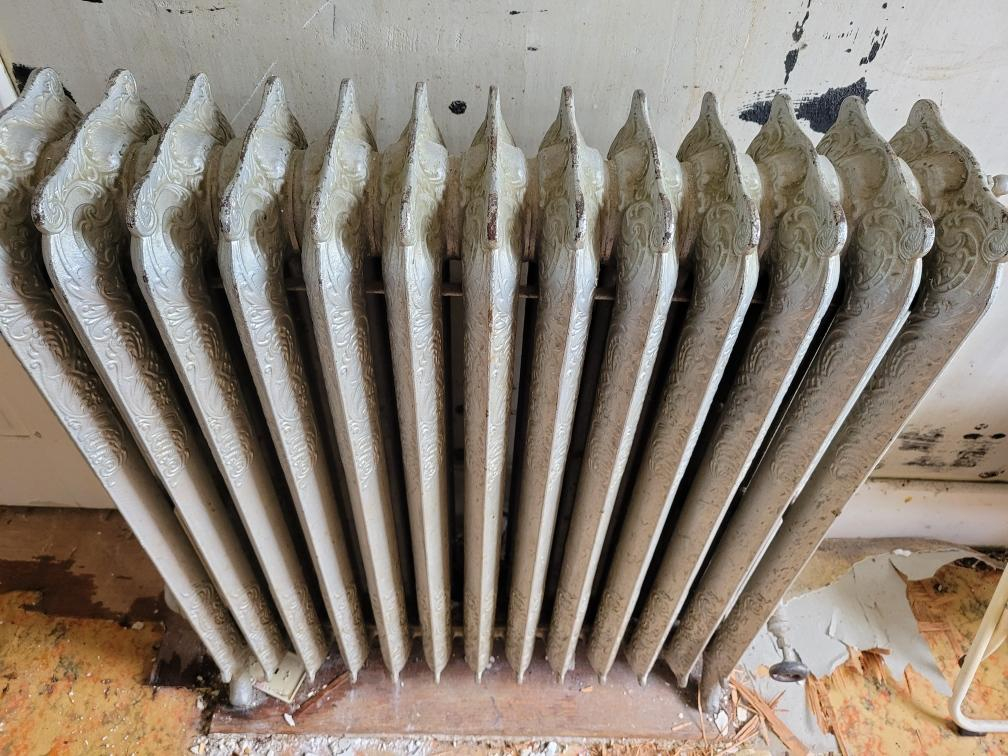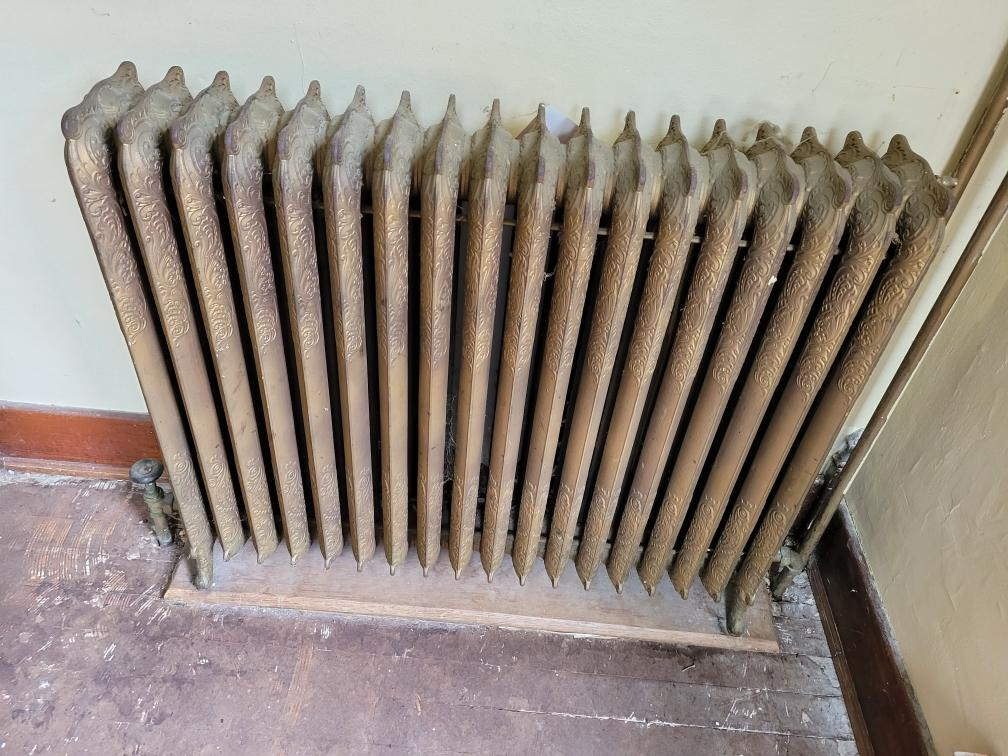Welcome! Here are the website rules, as well as some tips for using this forum.
Need to contact us? Visit https://heatinghelp.com/contact-us/.
Click here to Find a Contractor in your area.
If our community has helped you, please consider making a contribution to support this website. Thanks!
Selling Vintage Radiators
Options
PaigeKline
Member Posts: 3
I attached 2 pics of each one. We just bought this house and are upgrading the heat system for central air. We have small children and it isn't the safest route to go with. Previous owner of the house said they all worked last they were used, but they'd added electric baseboards places (which we also removed...not any safer from burns)
NW Ohio area. We are able to do a clean removal of any or all of them depending on what you want. They're beautiful...just not for us.

















NW Ohio area. We are able to do a clean removal of any or all of them depending on what you want. They're beautiful...just not for us.


















0
Comments
-
-
Good question...pecmsg said:What hazard?
Br. Jamie, osb
Building superintendent/caretaker, 7200 sq. ft. historic house museum with dependencies in New England3 -
Wow. That is some beautiful thermal mass.
I would love to work with that--if it were only 800 miles further east and north.0 -
-
-
I apologize for not being aware enough. I only know what my family and friends have told me, and I was under the impression it was less safe for children than updated duct work. I only did enough research to figure out how to get rid of them, as we're still choosing to update the entire system and I won't need them anymore.0
-
Well, they aren't less safe. They are, in fact, considerably safer -- unless you keep that ductwork and the assorted filters and coils and fans and all scrupulously clean. But, having made the choice, so be it. Permit me, however, to comment on your new HVAC system. Be sure that it has a very high level of filtration on it, and that you make sure that the humidity in the ducts is always low -- I'd say no more than a relative humidity of 50%, though some might go a tad higher. Change those filters frequently -- monthly is not too often -- and have the ductwork cleaned out -- vacuumed -- at least every other year and preferably yearly.PaigeKline said:I apologize for not being aware enough. I only know what my family and friends have told me, and I was under the impression it was less safe for children than updated duct work. I only did enough research to figure out how to get rid of them, as we're still choosing to update the entire system and I won't need them anymore.
Also make sure that there is adequate outside air exchange -- two full air changes with the outside air is a minimum for respiratory health, and I'd rather see four.Br. Jamie, osb
Building superintendent/caretaker, 7200 sq. ft. historic house museum with dependencies in New England2 -
This is a hot water system, not steam heat.
There looks like there may be enough radiation connected to be able to run at a lower temp.
But I am late to the party as the system locked up earlier.
If this is an old house you will never know the comfort you could have had as air blows around.
It is not uncommon to keep the hot water system in use for severe weather and use the forced air for the mild times.1 -
Wow, they're nice!I'm not a plumber or hvac man and my thoughts in comments are purely for conversation.0
-
I'm not an expert just a dude with a 1928 Sears kit home with forced hot water heat and radiators not much different than those, although much less ornate. Believe me when I tell you those radiators will never get hot enough to hurt your kids. I have a 4 yr old(in october) and 9 month old. It isn't even a thought. If you haven't started ripping these out I would strongly suggest you reconsider not getting rid of them. If you tighten up the building envelope with air sealing and insulation you'll be able to lower the water temperatures needed at design significantly. Possibly enough where the water never gets hotter than what you would shower in.
AC can still be add via a separate air handler and with ductwork designed and dedicated to just cooling will work much better than a system designed to heat and cool.0 -
-
I'm pretty sure we've lost @PaigeKline , the OP. As I read her original post, it appears that she had already decided to scrap the hot water system and go for forced air, and I dare say our advice to the contrary was -- at best -- unwelcome.
That said, should someone else contemplating such a change chance to read this thread, please consider...
There is some hazard involved in any heating system. The hazards are different, however, for different systems, and some are more manageable than others -- and some are more obvious.
We read in various threads that people are scared of children touching hot radiators (steam or hot water) and getting burned. It is certainly true that if one falls against a hot radiator and can't escape from it for some reason, one is going to get burned. No argument there. However, having observed several generations of small humans, never mind critters, the old adage "once burned, twice shy" seems to be true. A child may touch a hot radiator either by accident or curiousity -- once. That is going to hurt and the kid is going to cry. Unless someone forcibly holds the kid to the radiator, though, that's all it's going to be.
But now let's look at the "safer" alternative -- hot air. It does appear, at first, to be safer -- nothing to burn the kid. And, if it is scrupulously maintained it may, indeed, be safer. But it's that scrupulously maintained bit that is the kicker. The filters in the system must be changed regularly, unless they are the type which can be thoroughly cleaned. Otherwise they become near ideal breeding grounds for quite an interesting variety of molds and bacteria, all of which are harmful to respiratory health (some of which can cause lifelong damage). Similarly, all the ductwork, fans, and coils must be kept clean, and for the same reason.
And how many systems are kept that clean? Eh?Br. Jamie, osb
Building superintendent/caretaker, 7200 sq. ft. historic house museum with dependencies in New England3 -
PaigeKline if you're still out there, thanks for offering the radiators here. Good luck with the renovation. From the floors and woodwork, it looks like it was a great house at one time.
For you guys on the forum... I noticed many of the rads in the pics had a slab of wood under them. Do you think the wood was placed under the rads when they were installed or added later. Perhaps to keep the radiator feet from damaging the floor? I've been in a lot of old homes with radiators and never seen anything like that.
0 -
Another victim of the forced-air pushers. They must be salivating at the prospect of getting paid for tearing that system out. Pavlov would have found this fascinating.
@PaigeKline , if you're still out there, there is still time to change your mind. That house will NEVER be comfortable with forced-air, and you'll end up cranking the thermostat to compensate. This will jack up your fuel consumption.
Hot-water adiators scalding or burning someone is an urban legend. I have hot-water radiators in my own house. They never get hot enough to burn or scald.
Your A/C will work much better if it is optimized for cooling, and not trying to do heating with the same ductwork.
Don't tear those beauties out!All Steamed Up, Inc.
Towson, MD, USA
Steam, Vapor & Hot-Water Heating Specialists
Oil & Gas Burner Service
Consulting2 -
There were a lot more opinions on here than anticipated. Thank you for educating me on a few items. It did make me look more into the idea of keeping them, but we are still choosing to remove them. My intention was to find a buyer for them, not spark debate on what would be best for our home like we haven't made this decision based on several contractors/plumbers, an HVAC company, and a home inspector. If anyone is still looking - they're available.1
-
Around here there are very few cases where the consensus is favorable to removing radiant heat. I suspect the electric baseboards were installed during the 1970's when the fuel embargo caused fuel oil prices to skyrocket. Imagine those electric eyesores removed leaving just those beautiful ornate rads in a fully restored home tied to an effecient modcon boiler and no vents or ductwork cut into the floors or ceilings. Our 1835 Greek Revival has 10 cast iron radiators. Wouldn't trade them for any other heating system but I understand you have to make your own decisions about these things. I grew up in Montpelier OH, about as far NW as you can get. I remember cold winters and lake effect snows.
1 -
My family's MI 1855 farmhouse had 10 cast iron radiators. We renovated the house and kept the radiators. I went to Detroit and bought 10 more radiators. All 20 are now heated by a Viessmann 222F 130MBTU mod/con boiler. No thermostats. Just outdoor reset. Two zones: upstairs, downstairs. It works really well.
There were a lot of cast iron radiators available in Detroit. I was a 'kid in a candy store.' The warehouse was across the street from Henry Ford's original Model T plant. History is all around us. Don't neglect it.
Save the radiators.0 -
The removal of radiators will ALWAYS spark a debate here. Too far for me to take a couple off your hands.0
-
Unfortunately due to the labor involved they will probably wind up as scrap.Look for a local company that restores old homes. They’ll take them for free.0
-
For labor, ah once...there were men.
Save the radiators.0 -
Shes not far from me... But there is 16 I think, and my wife would kill me if I filled the garage with cast iron. My f150 would cry under the weight of just a few too.
Where about in NW ohio are we talking? Toledo, Defiance, Sandusky, Findlay?0 -
I’m looking for an under window radiator. Thanks Mark0
-
I'm in the st. Louis area with lots of radiator pieces of a few diff sizes trying to find something to do with them besides scrap them


 0
0 -
You cant beat cast iron on a new hot water system IMO.0
Categories
- All Categories
- 87.4K THE MAIN WALL
- 3.3K A-C, Heat Pumps & Refrigeration
- 61 Biomass
- 430 Carbon Monoxide Awareness
- 122 Chimneys & Flues
- 2.1K Domestic Hot Water
- 5.9K Gas Heating
- 115 Geothermal
- 168 Indoor-Air Quality
- 3.8K Oil Heating
- 78 Pipe Deterioration
- 1K Plumbing
- 6.5K Radiant Heating
- 395 Solar
- 15.8K Strictly Steam
- 3.4K Thermostats and Controls
- 56 Water Quality
- 51 Industry Classes
- 50 Job Opportunities
- 18 Recall Announcements




